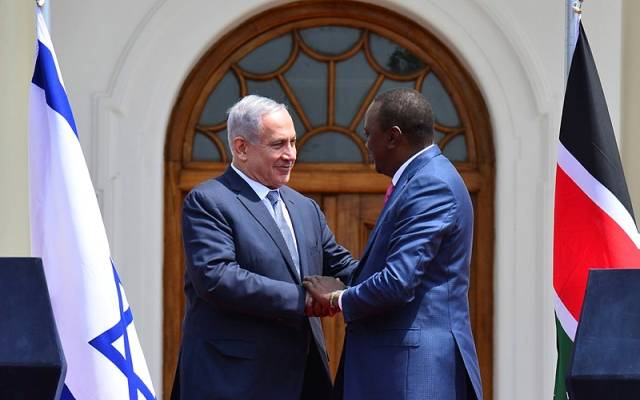
PM Netanyahu meets President of Kenya, Uhuru Kenyatta in Nairobi, Kenya. (Kobi Gideon/GPO)
Israeli Prime Minister Benjamin Netanyahu is on a historic trip to Africa where he is visiting Uganda, Kenya, Rwanda and Ethiopia. In exchange for its expertise in security and other fields, Israel wants African states to side with it at the United Nations. Israel hopes the visit will result in positive diplomatic results that will last for decades.
Africa has no better friend than the state of Israel for the practical needs of security and development Prime Minister Benjamin Netanyahu said Tuesday on the second leg of a four-country historic tour to pursue better relations with the continent.
Netanyahu is the first Israeli prime minister to visit Kenya and the first to visit sub-Saharan Africa in nearly three decades. He met Tuesday with President Uhuru Kenyatta on counter-terrorism, energy and agriculture, amid tight security. Netanyahu is also visiting Uganda, Rwanda and Ethiopia this week.
Israel played a prominent role in assisting newly independent African countries in the 1960s, but those relations crumbled in the 1970s, when Arab countries, promising aid, pressured African nations to limit or cut ties with Israel. African states were also opposed to Israel’s close ties to South Africa’s apartheid government.
In exchange for its expertise in security and other fields, Israel now wants African states to side with it at the United Nations, where the General Assembly overwhelmingly recognized “Palestine” as a non-member observer state in 2012.
Netanyahu said states must join forces against a “new form of terrorism” that threatens all countries. “I think we see eye to eye on the nature of this problem, and I think Africa and Israel overwhelmingly see eye to eye on this,” he said. He recalled the 2015 attack by the al-Shabab extremist group that killed 148 people on a college campus in Garissa in Kenya and the 2013 attack on Westgate Mall in Nairobi that killed 67.
Netanyahu said Kenyatta told him that African leaders would work to restore Israel as an observer to the 54-state African Union. “This is very significant from our point-of-view. The possibility of changing their direction and their attitude toward Israel would be a strategic change in Israel’s international position. I think that it will have very considerable effect regarding Israel’s international relations in the future, vis-à-vis our effort to bring about a very great number of countries that support Israel,” the prime minister said.
Kenyatta said the threat of terrorism demands partnership with nations with a common position against it.
“That’s why I strongly believe it’s critical for us reevaluate our relationship… with the state of Israel given the challenges that in we in the African continent are faced with today,” Kenyatta said.
Kenya has long been a target of Islamic attacks which have hit Israeli interests.
In a near-simultaneous attack in 2002, al-Qaeda terrorists blew up an explosives-laden vehicle at an Israeli-owned hotel on the Kenyan coast, killing 11 people, while others shot at an Israeli jetliner.
Kenyatta also said his country supports talks between Israel and the Palestinians.
By: AP and United with Israel Staff
